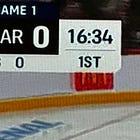Timing > Shape
A simple tip with profound implications
This morning I was listening to an episode of the Hockey PDOCast featuring former Arizona Coyotes video coach Steve Peters.
Peters brought up a great point when comparing the highly effective offensive-zone forechecks of the Florida Panthers and the Carolina Hurricanes.
“When Florida dumps the puck, their first forward is aggressively pursuing that puck.
“But watch their second and third forwards. That’s the difference between Carolina and Florida. Florida's got patience.
“There's a little hesitation between the second and the third forward. They're waiting for that puck to move before they move.”
From The Hockey PDOcast: What the Panthers Have Done to the Hurricanes To Go Up 2–0 in the East Final, May 23, 2025
From a theoretical point of view, Florida plays a strict 1-2-2 while Carolina uses more of a 2-1-2, especially off dump-and-chase plays. Here, we’re talking about shape.
However, the way that the difference is understood by the folks responsible for executing the forecheck (the players!) is mainly via a slight difference in timing.
CAR: F1 and F2 attack their checks at the same time, F3 waits for the next move
FLA: F1 attacks his check, F2 and F3 wait for the next move
The same idea applies in every other phase of play.
Does Player X move before Player Y?
…after Player Y?
Or do both move at the same time?
Or maybe both are holding their ground and waiting for Event Z to occur?
If, as a coach, you talk more about shape than timing, you may find your players struggling to implement your concepts once the game starts.
The idea that Timing > Shape can also be applied to a skill development context.
Keep reading with a 7-day free trial
Subscribe to Hockey Tactics Newsletter to keep reading this post and get 7 days of free access to the full post archives.


